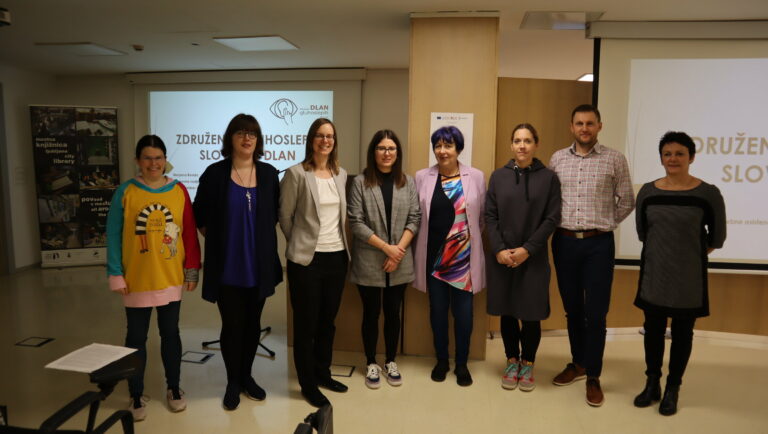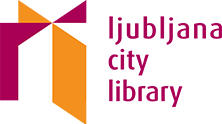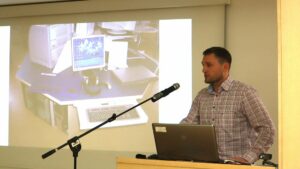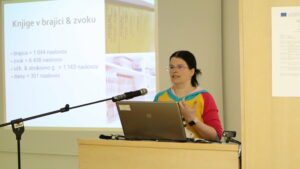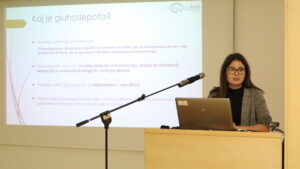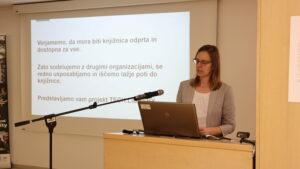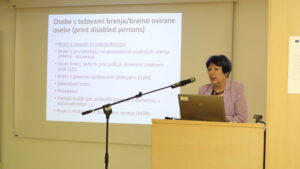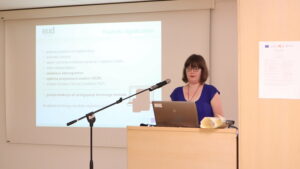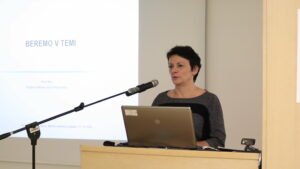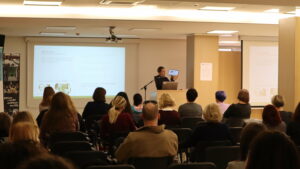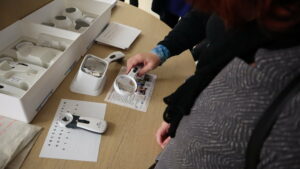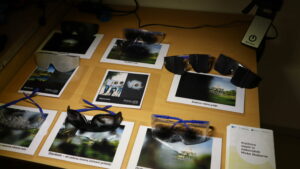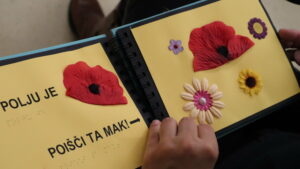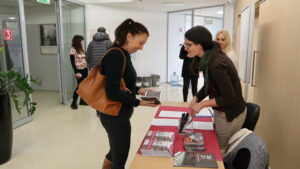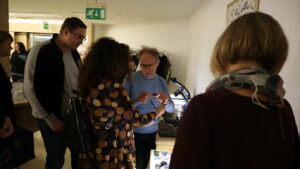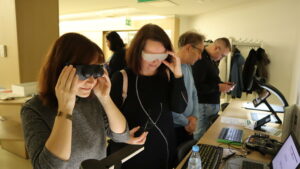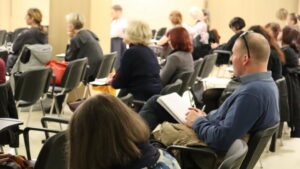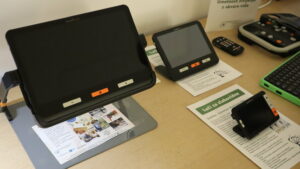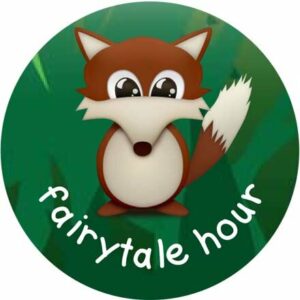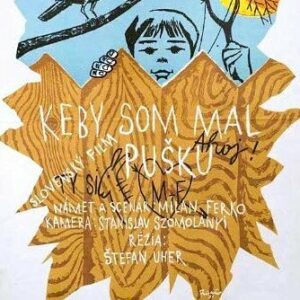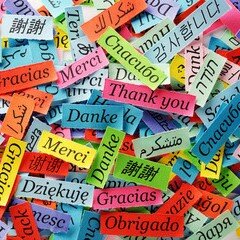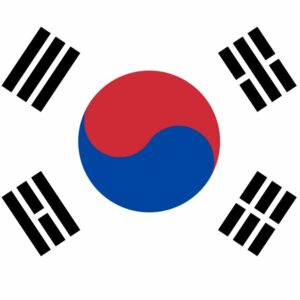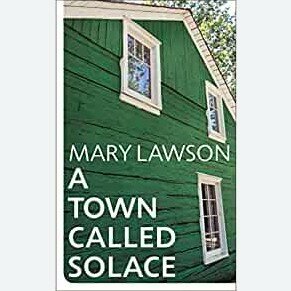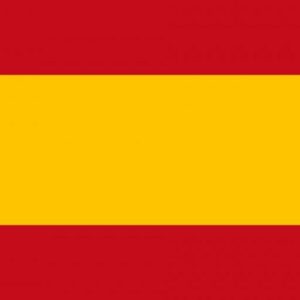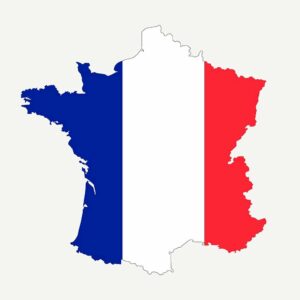Within the TECH.LIBRARY Project of Erasmus+ international professional conference We can do it – seeing forward has been organized in the Ljubljana City Library on November 17th 2022, where the lecturers from libraries and other organizations have presented their excellent work with the blind and the visually impaired.
At the beginning Aksinja Kermauner, PhD, presented types and characteristics of materials for the blind and the visually impaired. We were able to see picture books for the blind and other accessories for reading-disabled persons. The activities of the Library for the Blind and the Visually Impaired in Ljubljana were presented by Katarina Černe. The library organizes educational courses and exhibitions for public libraries and distributes adapted materials and promotional contents. The lecturer also presented the mobile app Blinda that enables the blind and the visually impaired to listen to audio books on their smartphones.
The Tech.Library project – for better library work with the blind and the visually impaired was presented by Mateja Lesar. Within the project the online platform was created, available at www.tech-library.eu; on it information may be found about the project and on the participating partners, the activities and events, as well as various tools that are of assistance to librarians at organizing activities for the blind and the visually impaired. It also gathers a number of examples of good practices that are already being carried out by the participating libraries. The platform enables libraries not only to acquire new ideas, but also to present their own examples of good practices. There are also some videos presenting operation of the tools intended for the blind and the visually impaired.
The first part of the conference was concluded by Andreja Hari’s presentation of the EODOPEN Project and the opening of access to digitized materials. The project addresses the problem of digitalisation of modern texts, from acquiring the copyright all the way to the creation of digitized publications in modern formats adapted to the needs of the blind and the visually impaired. The National and University Library in Ljubljana cooperates in the project through the work group Delivery Forms of Digitized Materials for Special Purposes, where the directives and recommendations for accessible formats are being prepared.
The second part of the conference was continued by examples of good practices of various organizations. Marjana Kenda presented the good practices of the The Deafblind Association of Slovenia (DLAN). The Association carries out various support forms of individualised assistance and guided activities in co-financed programmes. Within their informative and publishing programme several books were published, which tell the stories of the deafblind: Zgodbe ljudi, ki poslušajo s srcem in gledajo z dlanmi: Živeti z gluhoslepoto (I in II), (the Stories of People Who Listen with their Hearts and See with Their Palms: to Live with Deafblindness I and II), the book by Janko Plesec Veseli vandrovček (Happy Little Wanderer), and the manuals Haptični način sporazumevanja z ljudmi z gluhoslepoto (I in II) (Haptic Ways of Communication with Deafblind People, I and II) and Svet na DLANI: Jezik gluhoslepih (World at ones palm: the Language of the Deafblind). As an example of good practice, the book published by Litera Plastenje s(r)amot (Layers of Shames / Loneliness), written by Štefan Kardoš and Jožica Atelšek, members of the DLAN Associacion, was pointed to.
The work of The Museum of Gorenjska was presented by Anja Poštrak, who pointed out to problems, faced by museums at organizing exhibitions adapted to the blind and the visually impaired, as well as some solutions that enable the viewing of at least a part of their collections also to the blind and the visually impaired. So, e.g., they organized the viewing of the Oplen’s house (museum of habitation culture of the late 19th century) with the assistance of the touch pad.
Three presentations of good practice examples have also been included in the conference’s programme. Irena Muc from the Miran Jarc Library in Novo mesto presented the reading club We Read in Darkness, and the library’s recording studio where audio tapes of materials for the blind and visually impaired are prepared. We were very glad that two colleagues from Croatian public libraries have joined us. Vedrana Kovač Vrana from the City Library Ivan Goran Kovačić in Karlovac presented the activities of the blind and visually impaired library since the initial steps in 2003, when the library acquired its first computer with a speech programme software for the blind and the visually impaired, to activities it performs nowadays. The library cooperates with the Croat Library for the Blind in Zagreb, which allows its users to access about 700 audiobooks. Inside the library there is a Corner for the blind and the visually impaired, where the Poet Compact, a special device for text reading, and the Super Nova Screen-reader are located. The library also organizes the Reading Club for the blind and the visually impaired, called White Owl.
The conference was concluded by Karlo Galinec, who presented the development of services for the visually impaired in the Fran Galović Library in Koprivnica. The library carries out integration workshops for preschool and school children, presentations of the use of reading accessories for the blind and the visually impaired, as well as conferences on enabling substitute forms of reading to reading-disabled persons. The library cooperates closely with the Association of the Blind of the Koprivnica-Križevci region.
PRESENTATIONS OF CONTRIBUTIONS (in Slovene)
At the conference event, accessories used by the blind and visually impaired have been presented and tested, so that libraries may acquire them for their own users. The accessories were presented by Dušan Janković from the Diopta company.
We hope that the conference is going to be a stimulation for future new activities, project cooperation, as well as for deliberation on work with the blind and the visually impaired. Let the experiences of others encourage us to make a step forward, to complete our knowledge on the blind and the visually impaired, and to create new opportunities for quality living for all of us. Together we can do it – see forward.
